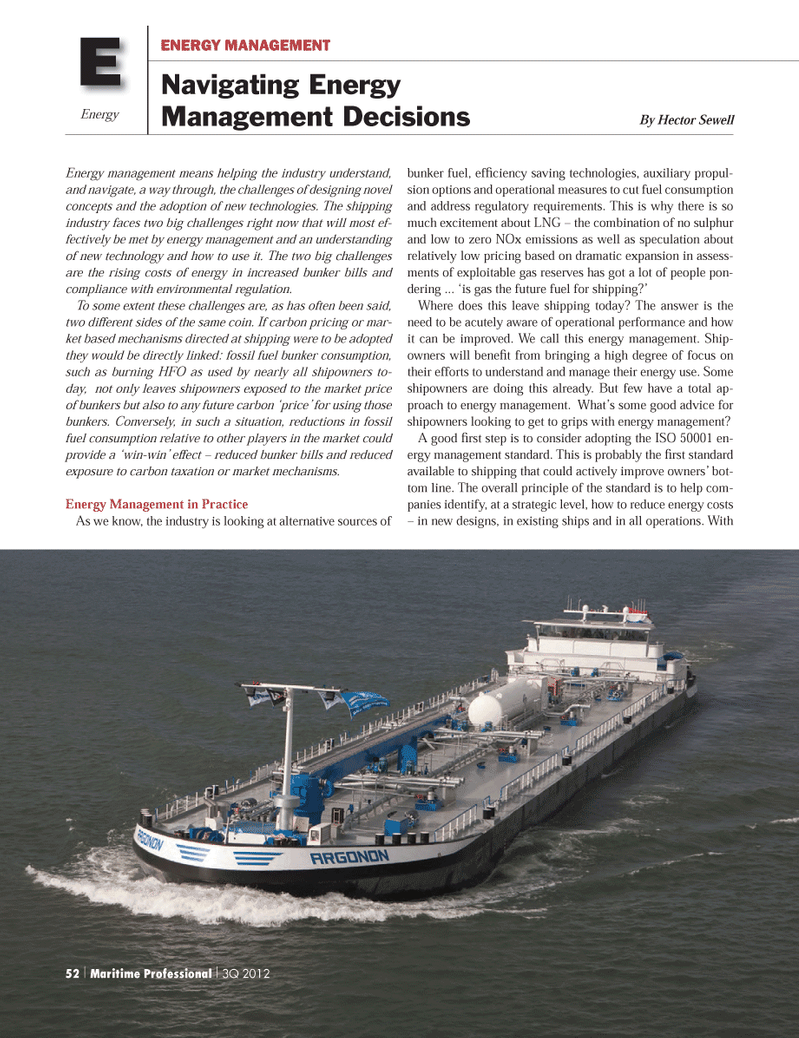
Page 52: of Maritime Logistics Professional Magazine (Q3 2012)
Classification Societies, Quality & Design
Read this page in Pdf, Flash or Html5 edition of Q3 2012 Maritime Logistics Professional Magazine
Energy ENERGY MANAGEMENT Navigating Energy Management DecisionsEBy Hector Sewell Energy management means helping the industry understand, and navigate, a way through, the challenges of designing novel concepts and the adoption of new technologies. The shipping industry faces two big challenges right now that will most ef- fectively be met by energy management and an understanding of new technology and how to use it. The two big challenges are the rising costs of energy in increased bunker bills and compliance with environmental regulation. To some extent these challenges are, as has often been said, two different sides of the same coin. If carbon pricing or mar- ket based mechanisms directed at shipping were to be adopted they would be directly linked: fossil fuel bunker consumption, such as burning HFO as used by nearly all shipowners to- day, not only leaves shipowners exposed to the market price of bunkers but also to any future carbon ?price? for using those bunkers. Conversely, in such a situation, reductions in fossil fuel consumption relative to other players in the market could provide a ?win-win? effect ? reduced bunker bills and reduced exposure to carbon taxation or market mechanisms. Energy Management in Practice As we know, the industry is looking at alternative sources of bunker fuel, efÞ ciency saving technologies, auxiliary propul- sion options and operational measures to cut fuel consumption and address regulatory requirements. This is why there is so much excitement about LNG Ð the combination of no sulphur and low to zero NOx emissions as well as speculation about relatively low pricing based on dramatic expansion in assess- ments of exploitable gas reserves has got a lot of people pon- dering ... Ôis gas the future fuel for shipping?Õ Where does this leave shipping today? The answer is the need to be acutely aware of operational performance and how it can be improved. We call this energy management. Ship- owners will beneÞ t from bringing a high degree of focus on their efforts to understand and manage their energy use. Some shipowners are doing this already. But few have a total ap- proach to energy management. WhatÕs some good advice for shipowners looking to get to grips with energy management? A good Þ rst step is to consider adopting the ISO 50001 en- ergy management standard. This is probably the Þ rst standard available to shipping that could actively improve ownersÕ bot- tom line. The overall principle of the standard is to help com- panies identify, at a strategic level, how to reduce energy costs Ð in new designs, in existing ships and in all operations. With 52 | Maritime Professional | 3Q 2012

 51
51

 53
53
